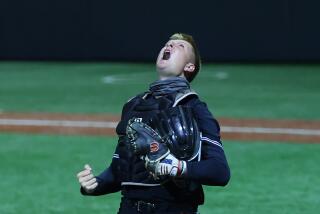For USC Baseball Team, Cuba Trip Is Invaluable
- Share via
Classroom settings are not limited to rooms fitted with blackboards. Lessons can be taught in large halls, sterile laboratories or even outdoors.
In the case of the USC baseball team this weekend, its classroom will be an island about 3,000 miles and a distinctly different philosophy away. The Trojans are on a five-day trip to Cuba to play three games against a team from the nation’s baseball federation beginning tonight either at its showcase facility, Estadio Latinoamericano, or a nearby field in Havana.
No problems getting these athletes to this class.
“I’ve been looking forward to it since we went on winter break,” Trojan first baseman Joey Metropolous said. “I couldn’t wait to get back.”
USC will experience contrasting sides of this nation of 11 million, even while staying within a relatively small area. Centuries-old buildings sculpted in stately Spanish colonial architecture mix with deteriorating villages. Supremely talented baseball players are often fitted in worn uniforms and old cleats. A buoyant, vibrant atmosphere emanates from a people living under a tightly controlling government.
It is a historic trip that two individuals with Trojan ties -- Adam Rendon and Dale Zeigler -- felt fitting for one of college baseball’s most successful programs.
Rendon, an Irvine-based financial consultant, is a former kicker for the USC football team. He didn’t play baseball, but he said he was inspired by former Trojan baseball coach Rod Dedeaux’s accomplishments at the collegiate and international levels. That led him to offer USC an experience similar to what he had arranged for high school-age teams in recent years.
“I know Rod was looking to go down there for quite some time,” he said. “Some of the officials down there had met Rod and worked with him before. This is in some ways a reunion trip for him.”
For help, Rendon enlisted Zeigler, a Seattle-based mortgage banker and longtime family friend who pitched for Dedeaux-coached teams in the late 1950s. They took their idea to USC Coach Mike Gillespie in March.
Initially, there were reservations.
“It had some credibility from the get-go,” Gillespie said. “But we certainly had some questions. What is the position of the university? What is the position of the country? What is the position of the president?
“Naturally, we were all concerned about this.”
What followed was months of communication among USC administrators, the University of Havana, the Federacion Cubana de Beisbol (Cuban Baseball Federation) and the U.S. Treasury Department.
Rendon said the willingness of Cuban officials to extend an invitation prompted the school to begin seeking approval of the U.S. government.
Although a U.S. embargo of Cuba has been in place since the early 1960s, the Treasury Department’s Office of Foreign Assets Control awarded travel licenses to the USC contingent. Travel is restricted, although exceptions are commonly given to journalists, government officials and students studying abroad.
In 1999, the Baltimore Orioles became the first professional team in 40 years to visit the nation. Other college teams such as Washington and Tennessee have been to the island within the last four years.
After securing the necessary licenses, Rendon, Zeigler, Gillespie and Jonathan Kotler, a former dean of the USC graduate studies program, visited Havana in July to scout the city and meet with Carlos Rodriguez Acosta, president of the Cuban Baseball Federation.
For Gillespie, the visit was like a trip back in time.
“It’s old, and it’s not like you’re in Brentwood,” said Gillespie, who has traveled abroad with assorted U.S. national teams. “But it was very clean.... The attitude of the people seemed to be very positive, very upbeat.
“I know they have a real appreciation for 1957 Chevys and Ford Fairlanes.”
Kotler said it is a scholastic experience that can’t be replicated in a common college setting.
“The thing that held my interest is this is one of those places that you hear a lot about but know little,” he said.
“If education extends beyond the classroom, [the players] are going to get quite an education. You look around the country, and it’s almost as if the clock stopped when the revolution happened.”
The Trojans have a traveling party of more than 200, including Dedeaux, Athletic Director Mike Garrett and other administrative personnel, family members and alumni.
Gillespie said they can expect to experience a country with a deep passion for its national sport and a willingness to display its best players against their American counterparts.
“From a selfish, myopic view of baseball, we’re lucky,” he said. “We’re playing against Cuban ballplayers that all of us have heard about. In the bigger picture, I think it’s very important that our players have this opportunity to experience this mystery of what we’re always hearing about.”
Said Metropolous: “You hear stories about how baseball is life down there. Just seeing how intense they treat baseball I think will give a lot of guys on the team a lot more respect for the game.”
More to Read
Go beyond the scoreboard
Get the latest on L.A.'s teams in the daily Sports Report newsletter.
You may occasionally receive promotional content from the Los Angeles Times.






